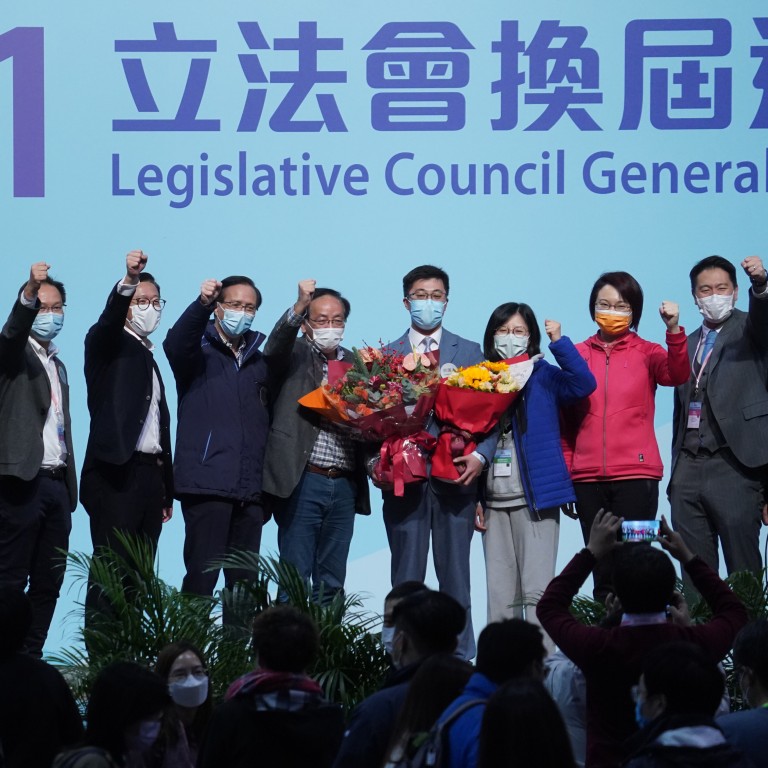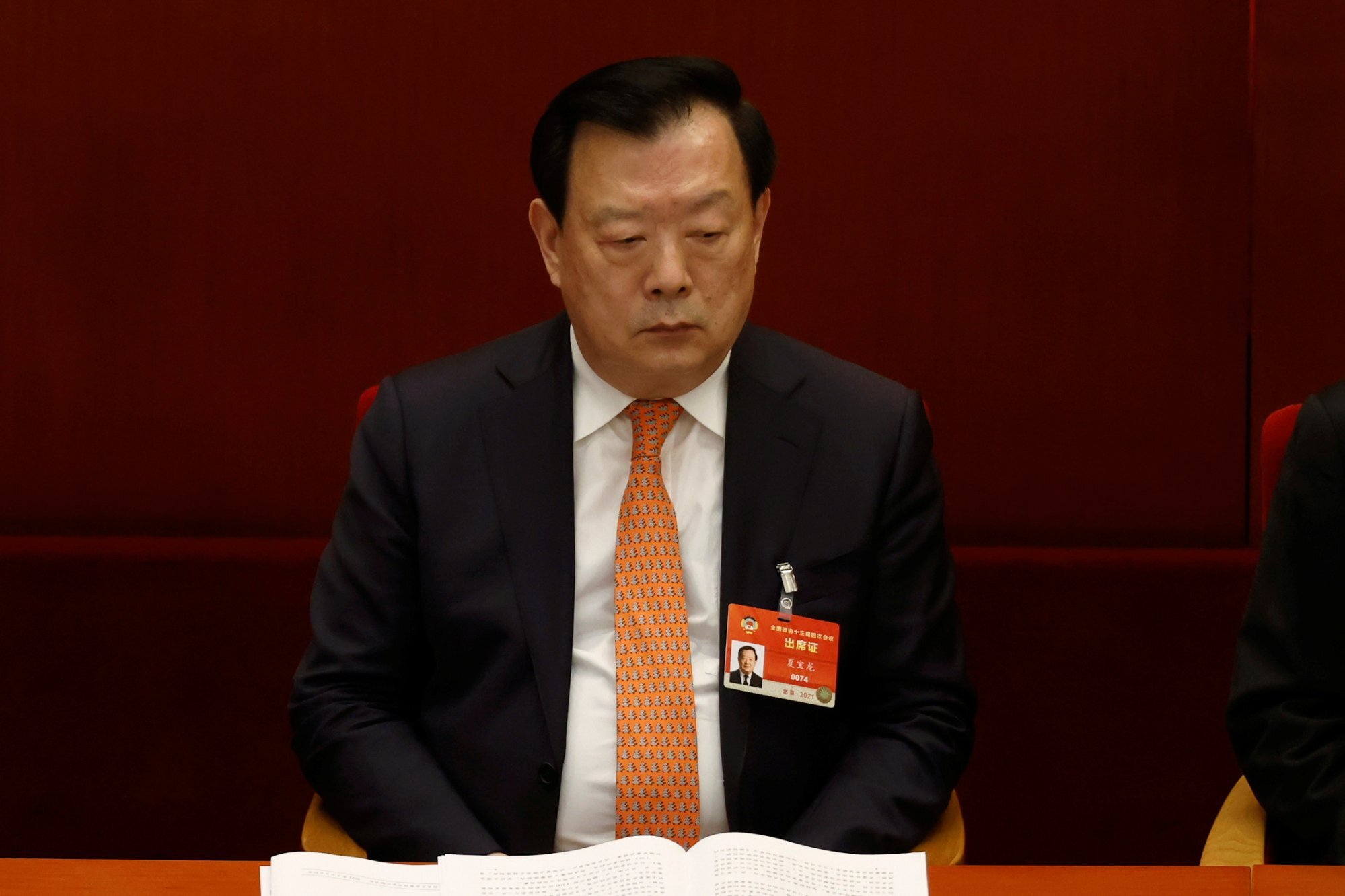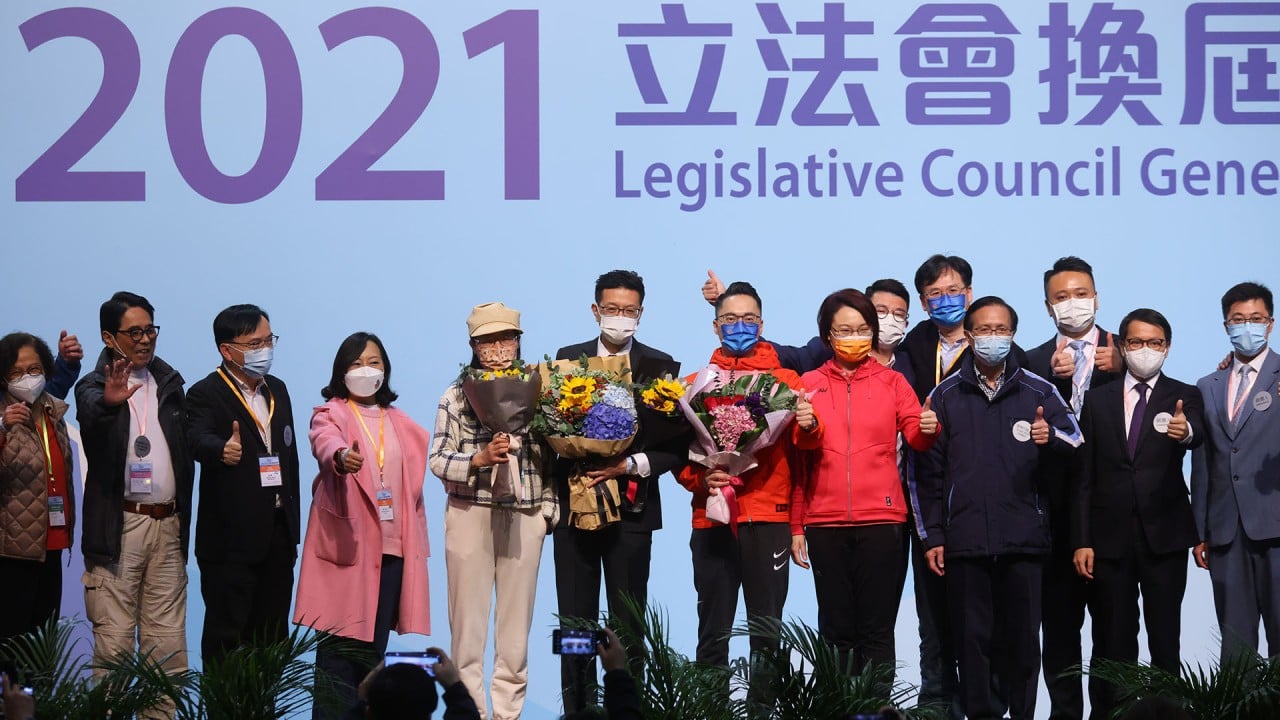
5 takeaways (and 1 surprise) from the Hong Kong Legislative Council election 2021: an unheeded call, a clean sweep and rising forces
- City’s first legislative election under Beijing’s political shake-up yielded record-low turnout but some surprise results
- Diversity did not gain traction among voters, as individuals with more unique backgrounds and moderates were handed a drubbing
Despite central government officials’ repeated assurances that they were not eyeing “political homogeneity” in Hong Kong’s new legislature, the Beijing-friendly camp ended up sweeping all but one seat, and all 11 centrist candidates running in the directly elected geographical constituencies lost by wide margins.
There were a few surprise results, as several pro-establishment incumbents and popular candidates were ousted. A new and rising force comprising politicians and businessmen with mainland links had entered the political arena.
Here are the five key takeaways from Sunday’s election:
1. A directive that fell on deaf ears?
A week ahead of the Legco election, Xia Baolong, director of the State Council’s Hong Kong and Macau Affairs Office, sought to reassure residents that the central government was not asking for political homogeneity following the overhaul, urging people to cast their ballots.
Xia defended the diversity of the race by pointing to the distinctive backgrounds of the 153 candidates, whom he said came from different professions. They were also of varying ages and birthplaces, he noted, with some born and raised in Hong Kong, while others being Mandarin-speaking mainlanders who had settled in the city, as well as those born in Taiwan, and also foreigners who have taken up Chinese nationality.
Hong Kong splits into ‘parallel universes’ as some residents vote, others seek out fun
But it appeared his call failed to register with the 1,448 members of the Election Committee who were tasked to pick 40 representatives – from the 51 candidates running – for the legislature.
Most of the 11 hopefuls who lost the race were those cited by Xia in justifying diversity. They comprised: Lan Kwai Fong group chairman Allan Zeman and former government official Mike Rowse, the only two Westerners in the race; Taiwan-born Phoenix TV host Vie Tseng Chin-i; bus driver Choy Wing-keung and electrician Vincent Diu Sing-hung; as well as the 25-year-old Joseph Chan Hoi-wing, the youngest candidate from the Democratic Alliance for the Betterment and Progress of Hong Kong (DAB).
Asked about the surprising outcomes, city leader Carrie Lam Cheng Yuet-ngor said it was up to voters to exercise their “free will” and they determined the results. Supporters said the final line-up showed Beijing did not have a hand in fixing a list, a debate likely to continue for some time.

2. Clean sweep by the pro-establishment in the geographical constituencies
With the mainstream opposition parties sitting out and arguing the election was designed to stifle dissent with the newly created vetting mechanism, only around a dozen centrist or moderate candidates threw their hats into the ring in a bid to break what would be a near-total monopoly by the Beijing-friendly camp.
But to the surprise of some, all 11 non-establishment contenders vying for a directly elected seat in the 10 geographical constituencies lost by wide margins as they failed to mobilise supporters of the traditional pro-democracy camp to vote.
Hong Kong government must be bolder after electoral overhaul: CY Leung
Tik Chi-yuen, of the middle-of-the-road party Third Side, emerged as the only survivor after beating his rivals in the social welfare functional constituency.
The results apparently went against the calls earlier made by pro-Beijing heavyweight and Election Committee member Lo Man-tuen.
Lo made a public appeal for supporters of the pro-establishment camp last Wednesday to consider supporting centrist candidates to ensure diversity in the legislature. A “shutout victory” by their camp would be a “trap” that would only provide fodder for critics, he said, such as “Western forces hoping to attack the new electoral system for being homogenous”.
3. The rise of new forces
While the so-called moderate bloc is now a non-starter in the new legislature, a new force comprising candidates with mainland backgrounds has emerged.
In New Territories North, political novice Gary Zhang Xinyu, of the New Prospect for Hong Kong, founded by mostly mainland-born Hongkongers, beat pro-establishment lawyer Wilson Shum Ho-kit.
Reverend Canon Peter Koon Ho-ming, provincial secretary general of the Hong Kong Anglican Church, was also elected via the Election Committee constituency, becoming the first religious representative in the legislature since the city’s handover to China in 1997.
4. ‘Bad boy’ Liberal Party further marginalised
The pro-business Liberal Party, which for years has been considered as the “bad boy” within the Beijing-friendly camp for being vocal against the government, was further side-lined following Sunday’s election.
Pro-establishment candidates make emergency appeal for votes in Hong Kong poll
Bagging only 82 votes, he was unseated by Sunny Tan, executive vice president of apparel and accessories manufacturer Luen Thai International Group, who received 172 ballots from corporate voters. The party’s significance had been further weakened as it now only retained four seats in the 90-strong legislature.
Christopher Cheung Wah-fung, an incumbent of the Business and Professionals Alliance, was also unseated by Robert Lee Wai-wang, chairman of Hong Kong Securities Association in the financial services sector. The alliance however still holds eight seats in the new Legco.

5. A record-low turnout rate
Only 1.35 million voters – or 30.2 per cent of the total electorate – cast ballots in the geographical constituencies on Sunday, the lowest since the city’s return to Chinese rule in 1997. The figure was far below the record high of 58.3 per cent in the last Legco election in 2016, as well as 71.2 per cent in the 2019 district council poll, which was held at the height of the anti-government protests that year.
The voter apathy seen from the general public stood in stark contrast to the almost-full turnout in the fight for seats voted by the Election Committee. Stacked with Beijing loyalists, some 1,426 members – or 98.5 per cent of the 1,448 voters – cast their ballots.
The turnout of the 28 functional constituencies stood at 32.2 per cent, a big drop from 2016’s 74.3 per cent. Several professional sectors which used to be opposition strongholds and were returned via individual instead of corporate voters, had recorded the most lukewarm voter response.
For instance, only 19.4 per cent of 13,974 voters in the social welfare sector cast their vote – the lowest turnout of all – while sectors such as education, accountancy as well as medical and health services all only recorded a turnout of around 30 per cent. In the commercial (third) sector newly created to represent mainland enterprises, nearly 99 per cent, or 285 of the 288 electors, voted.
While electoral authorities did not provide a breakdown of spoiled and blank votes, a Post analysis showed that a total of 27,495 ballots cast in the geographical constituencies were found to be invalid, amounting to around 2 per cent of the total vote count. In 2016, 1.5 per cent of the ballot papers – or 33,872 – were found to be invalid.
6. ‘Democracy with Hong Kong characteristics’ – the white paper
It also said the new system would not only ensure “sound, long-term development of democracy in Hong Kong”, but also foster “favourable conditions” necessary for universal suffrage in the election of the chief executive and members of the legislature.
Carrie Lam had said a “correct understanding” of the city’s political development would help Hong Kong become more democratic.


